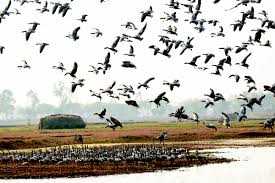
Affirms protection of Hokersar Wetland
The Department of Wildlife Protection, Jammu & Kashmir Government, has issued a detailed clarification in response to the recent Daily Excelsior article titled “World Famous Hokersar Water Body Facing Grave Encroachment Threat,” published on July 23, 2025. The department categorically denied any ongoing or unchecked encroachment at the Hokersar Wetland.
Recognized as a Ramsar Site of international importance and protected under the Wildlife Protection Act, the Hokersar Wetland remains one of Kashmir Valley’s most ecologically vital freshwater marshes. Officials reaffirmed that no new encroachments have taken place in recent years. Strict protection measures are in effect, including GIS-mapped boundary surveillance, regular field patrolling, and enforcement actions as necessary.
The wetland covers 13.54 square kilometers and is fully delineated in the department’s geospatial records. While some legacy cultivation, such as seasonal paddy farming on the fringes, exists, these practices are being addressed through notices, legal action, and ecological restoration in line with the Wildlife Protection Act of 1972.
To resolve disputes regarding boundary demarcation conducted during 2019–20, a joint committee led by the Assistant Commissioner Revenue, Budgam, conducted a scientific survey using Electronic Total Station (ETS) technology. The final validated report from the Revenue Department is pending, with ongoing coordination to legally finalize the wetland boundaries.
Hydrological regulation efforts have notably improved water levels at Hokersar. The construction of inlet and outlet gates by the Irrigation and Flood Control Department has raised water levels to the highest in two decades. This natural flooding has submerged fringe cultivation areas, deterring unauthorized use and contributing to habitat restoration goals outlined in the Integrated Management Action Plan (IMAP) 2022–27.
A senior official from the Wildlife Department criticized the media report for conflating historical land use with actual encroachments, which misrepresents the situation on the ground. “The wetland enjoys enhanced legal and ecological protection. Misleading reports not only demoralize staff but distract public attention from genuine restoration efforts,” the official said.
The department reiterated its commitment to protecting and rejuvenating the Hokersar Wetland in line with international conservation standards. It also appealed to the media to practice responsible journalism, urging verification of facts before publishing claims lacking field validation. “Misinformation undermines conservation work and public trust. We expect media to uphold ethical standards and avoid alarmist content,” the department stated.
To ensure accurate public information, the department has offered to facilitate media field visits to the wetland.
Affirms protection of Hokersar Wetland
The Department of Wildlife Protection, Jammu & Kashmir Government, has issued a detailed clarification in response to the recent Daily Excelsior article titled “World Famous Hokersar Water Body Facing Grave Encroachment Threat,” published on July 23, 2025. The department categorically denied any ongoing or unchecked encroachment at the Hokersar Wetland.
Recognized as a Ramsar Site of international importance and protected under the Wildlife Protection Act, the Hokersar Wetland remains one of Kashmir Valley’s most ecologically vital freshwater marshes. Officials reaffirmed that no new encroachments have taken place in recent years. Strict protection measures are in effect, including GIS-mapped boundary surveillance, regular field patrolling, and enforcement actions as necessary.
The wetland covers 13.54 square kilometers and is fully delineated in the department’s geospatial records. While some legacy cultivation, such as seasonal paddy farming on the fringes, exists, these practices are being addressed through notices, legal action, and ecological restoration in line with the Wildlife Protection Act of 1972.
To resolve disputes regarding boundary demarcation conducted during 2019–20, a joint committee led by the Assistant Commissioner Revenue, Budgam, conducted a scientific survey using Electronic Total Station (ETS) technology. The final validated report from the Revenue Department is pending, with ongoing coordination to legally finalize the wetland boundaries.
Hydrological regulation efforts have notably improved water levels at Hokersar. The construction of inlet and outlet gates by the Irrigation and Flood Control Department has raised water levels to the highest in two decades. This natural flooding has submerged fringe cultivation areas, deterring unauthorized use and contributing to habitat restoration goals outlined in the Integrated Management Action Plan (IMAP) 2022–27.
A senior official from the Wildlife Department criticized the media report for conflating historical land use with actual encroachments, which misrepresents the situation on the ground. “The wetland enjoys enhanced legal and ecological protection. Misleading reports not only demoralize staff but distract public attention from genuine restoration efforts,” the official said.
The department reiterated its commitment to protecting and rejuvenating the Hokersar Wetland in line with international conservation standards. It also appealed to the media to practice responsible journalism, urging verification of facts before publishing claims lacking field validation. “Misinformation undermines conservation work and public trust. We expect media to uphold ethical standards and avoid alarmist content,” the department stated.
To ensure accurate public information, the department has offered to facilitate media field visits to the wetland.
© Copyright 2023 brighterkashmir.com All Rights Reserved. Quantum Technologies